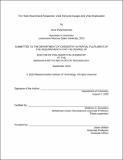| dc.contributor.advisor | Matthew D. Shoulders. | en_US |
| dc.contributor.author | Ponomarenko, Anna,Ph. D.Massachusetts Institute of Technology. | en_US |
| dc.contributor.other | Massachusetts Institute of Technology. Department of Chemistry. | en_US |
| dc.date.accessioned | 2021-01-06T20:16:42Z | |
| dc.date.available | 2021-01-06T20:16:42Z | |
| dc.date.copyright | 2020 | en_US |
| dc.date.issued | 2020 | en_US |
| dc.identifier.uri | https://hdl.handle.net/1721.1/129290 | |
| dc.description | Thesis: Ph. D., Massachusetts Institute of Technology, Department of Chemistry, September, 2020 | en_US |
| dc.description | Cataloged from student-submitted PDF of thesis. | en_US |
| dc.description | Includes bibliographical references. | en_US |
| dc.description.abstract | Viral outbreaks follow human history, as illustrated by past and ongoing pandemics. The continuous nature of viral threats to global health is dictated by viral evolution, which enables the rise of resistance to therapeutic and preventive measures, emergence of new strains, and host switching. Addressing all of these challenges requires a deep understanding of all aspects of viral evolution at the host-pathogen interface. The underlying root of viral evolution is the high mutation rate coupled with relatively short replication times. Rapid accumulation of mutations produces mutant viral proteins with new biological functions, such as escape from the host immune system. However, such mutations are generally deleterious to protein structure or folding and thus confer a high biophysical cost, which most viruses are not equipped to address on their own. | en_US |
| dc.description.abstract | In contrast, host cells have an extensive chaperone network, which assists folding and resolves misfolding of endogenous cellular proteins. Chaperone assistance also facilitates evolution of host proteins, and, recent evidence suggests, of viral proteins as well, arising from the extensive involvement of chaperones in the viral lifecycle. In this thesis, I address the implications of host chaperones potentiating viral protein evolution. First, I describe how influenza virus resolves the biophysical cost of adaptive mutations by exploiting host chaperones. High-throughput profiling of influenza nucleoprotein mutational tolerance revealed the dependence of a key 1918 Spanish Flu adaptive variant on the availability of host chaperones. Limited access to host chaperone assistance, especially at fever temperatures, restricts accessibility of this structurally deleterious innate immune escape variant. | en_US |
| dc.description.abstract | Next, I address molecular details of chaperone folding assistance required for efficient propagation of this adaptive mutant. This work provides the first experimental evidence of host chaperones defining the accessibility of evolutionary important protein variants. Such dependence on host chaperone assistance highlights the vulnerability of rapidly mutating viral proteins. Finally, I demonstrate that excessive upregulation of the host proteostasis network can also render viruses vulnerable and restrict HIV-1 replication. Overall, interaction with the host chaperones is a critical determinant of viral evolution, and the extent of such interaction has to be carefully regulated throughout the viral life cycle. | en_US |
| dc.description.statementofresponsibility | by Anna Ponomarenko. | en_US |
| dc.format.extent | 148 pages | en_US |
| dc.language.iso | eng | en_US |
| dc.publisher | Massachusetts Institute of Technology | en_US |
| dc.rights | MIT theses may be protected by copyright. Please reuse MIT thesis content according to the MIT Libraries Permissions Policy, which is available through the URL provided. | en_US |
| dc.rights.uri | http://dspace.mit.edu/handle/1721.1/7582 | en_US |
| dc.subject | Chemistry. | en_US |
| dc.title | The host heat shock response, viral immune escape and viral replication | en_US |
| dc.type | Thesis | en_US |
| dc.description.degree | Ph. D. | en_US |
| dc.contributor.department | Massachusetts Institute of Technology. Department of Chemistry | en_US |
| dc.identifier.oclc | 1227522146 | en_US |
| dc.description.collection | Ph.D. Massachusetts Institute of Technology, Department of Chemistry | en_US |
| dspace.imported | 2021-01-06T20:16:40Z | en_US |
| mit.thesis.degree | Doctoral | en_US |
| mit.thesis.department | Chem | en_US |
